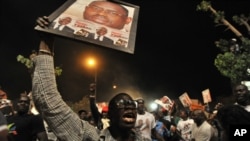Many Senegalese said they voted for newly elected President Macky Sall because of his promise to lower the cost of living.
Political analyst Aly Ndiaye said one of Sall’s key policy promises as a candidate was to lower the costs of essential products such as rice and oil by slashing the taxes on these products.
“He has said he will do it by cutting some waste from the Senegal’s presidential expenses, travel expenses, because the budget of Senegalese presidency has moved from 4 billion in 200o to 95 billion CFA,” said Ndiaye who was one of Sall’s supporters in the election’s second round.
Ndiaye added that Sall’s foreign policy will closely resemble outgoing President Abdoulaye Wade’s, especially since Sall served as Wade’s prime minister from 2004 to 2007 and played a key role in the implementation of those policies.
“He has always said that anything that the outgoing regime has done in foreign policy that has worked, he’s going to implement it,” said Ndiaye, though he stressed Sall will differ from Wade when it comes to unilateralism, as Wade sometimes broke with regional bodies such as the Economic Community of West African States on international issues.
Sall, a former Minister of Mining, has also promised to conduct a thorough audit of the government’s energy sector.
Ndiaye said though Sall has not specifically singled out the mining industry, the growth of gold mining under Wade warrants a closer look by Sall’s government.
“Macky has said the very first thing he will do will be auditing all the major sectors where there is a lot of money,” Ndiaye said, “making sure that we know what has been done, how much money has been spent. Only after that, responsibility and accountability will be held.”
Sall will be Senegal’s fourth president since independence. He was one of 13 opposition candidates in the first round of the presidential election, which Mr. Wade won with 35 percent of the vote.
But the losing opposition candidates turned their support to Mr. Sall, and hours after the polls closed on Sunday, Wade conceded defeat.




